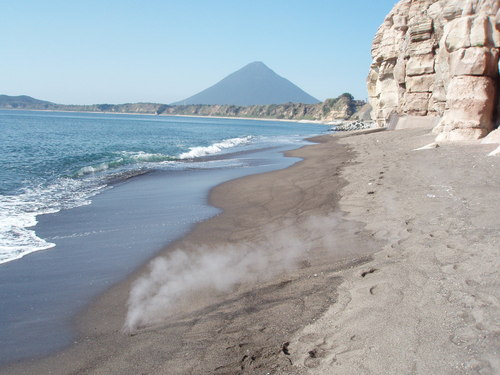Research Highlights
Virus discovered with largest single DNA strand
Researchers have identified a bizarre virus in a volcanic hot spring in Japan.
A team of Japanese and French researchers have discovered the first known virus in a thermal environment with single-stranded DNA.
The Aeropyrum coil-shaped virus (ACV) was isolated from a culture of Aeropyrum pernix from a coastal hot spring in southern Japan. A. pernix is a single-celled microorganism belonging to the Archaean kingdom, growing optimally at 90-95°C.
The findings open up the possibility that thermophilic RNA viruses might also exist, offering further support to the theory that self-replicating RNA was the precursor to life on Earth.
Before this discovery, some researchers speculated that only double-stranded DNA viruses were stable enough to survive in extreme thermal environments, says one of the researchers, environmental virologist Tomohiro Mochizuki from the Earth-Life Science Institute (ELSI).
"At the moment we have absolutely no idea how widespread ACV and its relatives - the newly established viral family Spiraviridae - are globally. We also have no idea how diverse single-stranded DNA viruses are in the thermal environment. What we know about the diversity of archaeal viruses is just the tip of the iceberg," says Mochizuki. Details of the discovery were reported in the journal Proceedings of the National Academy of Sciences.
ACV's single-stranded DNA is also the largest of its kind found in any virus. It is more than double the size of the previous record holder. This suggests that ACV has developed an efficient solution for keeping its single DNA strand intact at temperatures around water's boiling point.
"Generally, single-stranded DNA is much more fragile than double-stranded DNA. Considering its extremely harsh environment, it was truly surprising that a hyperthermophilic single-stranded DNA virus could have such a huge genome," says Mochizuki.
Scientists believe the distinctive features of archaeal viruses living in extremely hot environments could reflect those of an ancient virosphere. Understanding them could contribute to better insights about how viruses and cells evolved.
"This finding also opens up the possibility of the existence of hyperthermophilic RNA viruses," says Mochizuki. Currently, no RNA viruses have been found in the entire Archaean kingdom, one of three domains of life that include Bacteria and Eukarya.
"Since life is believed to have started in the thermal RNA world, it is extremely important to explore the modern RNA virus in these environments," he says.
"If we could find a thermal RNA virus, this might give us clues about the temperature of the origin of life. It may even tell us where DNA came from as well."
Mochizuki's current research interests are focused on finding thermal RNA viruses as well as understanding the diversity of viruses in thermal environments.

A bizarre new virus has been discovered in the Yamagawa hot spring in southern Japan, where the steam can reach 104 degrees Celsius. Credit: Tomohiro Mochizuki
Reference:
Mochizuki. T., Krupovic. M., Pehau-Arnaudet. G., Sako. Y., Forterre. P. & Prangishvili. D. Archaeal virus with exceptional virion architecture and the largest single-stranded DNA genome. Proceedings of the National Academy of Sciences 109, 13386-13391 (2012) doi:10.1073/pnas.1203668109












